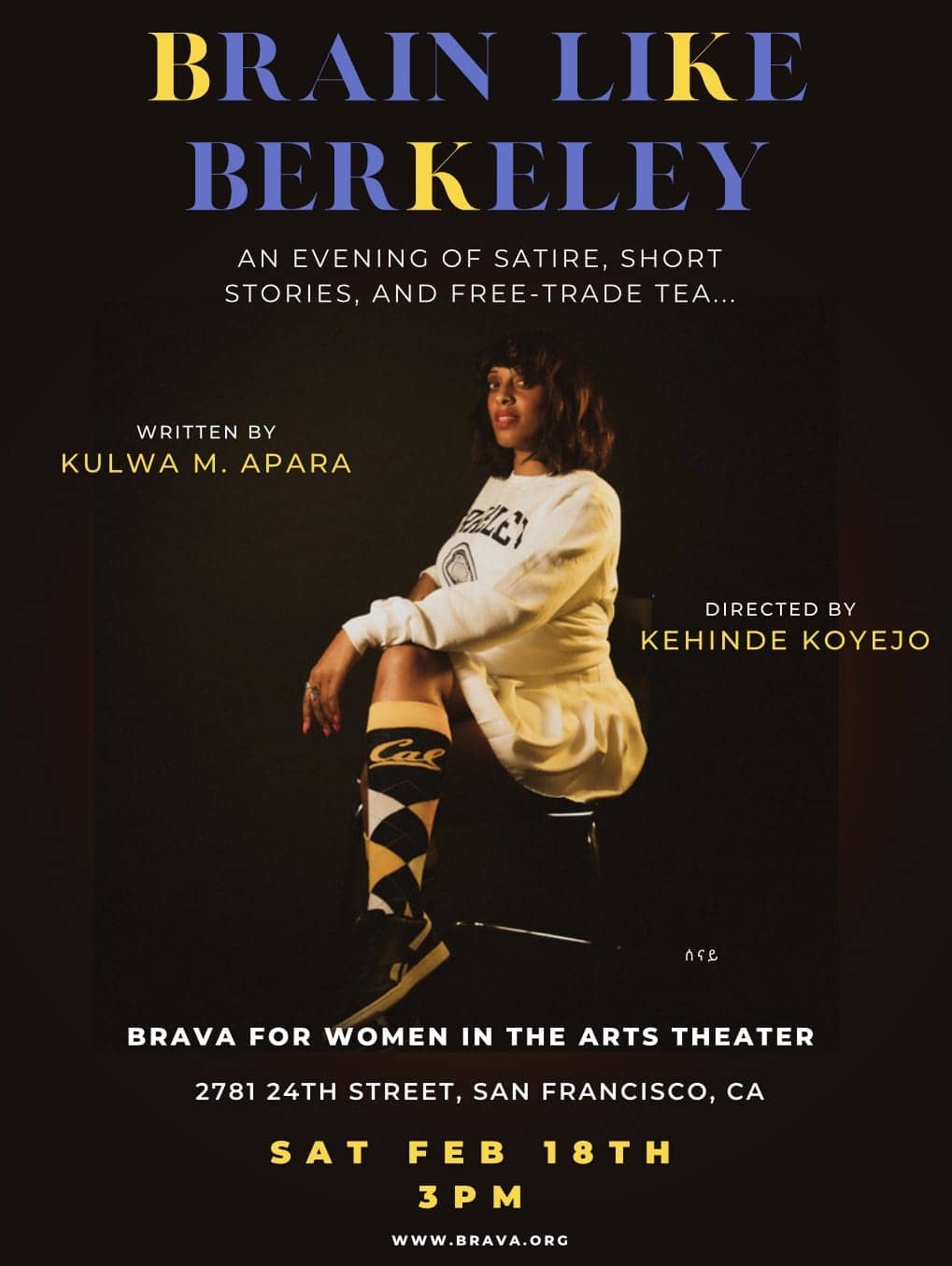Kulwa Apara writes and performs one-woman play, “Brain Like Berkeley”
“Brain Like Berkeley” is a satirical spin on the oversexualization of Black women and disregard for intellect and creativity we harness in our brains. The post Kulwa Apara writes and performs one-woman play, “Brain Like Berkeley” appeared first on San Francisco Bay View.


by JR Valrey, The Minister of Information and Oakland Bureau Chief
“Brain Like Berkeley” is a one-woman play, written and performed by Kulwa Apara and directed by Kehinde Koyejo, that will be premiering at the Brava Theater in San Francisco on February 18th. I sat down to talk to Kulwa Apara to talk about her one-woman play that utilizes excerpts out of her soon-to-be published memoirs. If you’re available on February 18th, you will not want to miss this very unique experience.
JR Valrey: What inspired you to do a one-woman play and express yourself through that medium?
Kulwa Apara: I have always loved the dramatic arts, because I come from a hella dramatic family. We are naturally dramatic, excessive, and over-the-top in how we show up in the world, and how we love on one another. Because of this, I naturally gravitated towards theater as a child and youth. Coming from a Pan-African household, I grew up with several playwrights on my bookshelf: James Baldwin, August Wilson, Lorraine Hansberry, and Zora Neale Hurston, just to name a few. So for me, choosing to tell my story as a one-woman show is the most authentic format.
JR Valrey: What is “Brain Like Berkeley” about? What inspired you to name your one-woman production after some Frank Ocean lyrics in the song “Novacane”?
Kulwa Apara: Well, to be honest, I chose the title because it is a satirical spin on the oversexualization of Black women and the blatant disregard for the intellect and creativity we harness in our brains. I will also be sharing my struggle with depression, which is all about brain chemistry, neurological synapses, and serotonin levels. It’s no secret that several past and current Berkeley students struggle with major depressive thoughts and even suicidal ideation. So, “Brain Like Berkeley” encompasses a lot. It’s a loaded title in more ways than one.
JR Valrey: Can you talk a little bit about the autobiography that you are writing? How does it correlate with the one-woman play?
Kulwa Apara: The one-woman play is taken from short stories directly out of my work-in-progress memoir of the same title. This autobiography combines short stories that explore the everyday TRIUMPH in the trauma & drama of real life for an educated Black woman in the Bay Area. No amount of education, beauty, or money can protect us Black women from racism, sexism, and anti-Blackness both within and outside of our communities. My memoir is a homage to my journey thus far, and it’s a nod to all women of all colors and cultures who understand what it’s like to be stepped on, simply because we have a vagina.
JR Valrey: How has being from the Bay Area given you a unique perspective on life and the world?
“Kittens in an oven don’t make them biscuits!”
Kulwa Apara: Being from the Bay Area is a huge blessing because it has positioned me to not be impressed by basic shit. Coming from the Bay, I was raised around true scholars, revolutionaries, artists, and freedom fighters. Thanks be to God, Bay Areans are slightly more grounded than people from other parts of the country, so this has allowed me to tap into that spirit, and feel confident in who I am despite never quite “fitting in” to one particular scene. Because I’m from Berkeley, I’m super comfortable with being weird and different. I come from totally hippie roots. I’m a tree-hugger in heels, and I was raised in a Spanish speaking household by a mother who practiced Christianity and Ifa, and a father who was a scientific socialist and Muslim, and recovering addict. I’m hella diverse.
JR Valrey: “Brain Like Berkeley” is being directed by Kehinde Koyejo, how did that come about? How do you two know each other?
Kulwa Apara: I have known Kehinde Koyejo since I was in high-school. Somehow my own twin sister, who is also named Kehinde, met Kehinde Koyejo’s twin sister named Taiwo. Taiwo took my twin sister under her wing and taught her how to sew swimsuits. I believe Taiwo was studying at FIDM in San Francisco at the time. Anyhow, Kehinde Koyejo was producing these huge Hip-Hop fashion shows in Oakland, and she allowed my twin sister to feature her swim-suit line. I modeled some of the swimsuits, and the rest is history. My twin and I were taken in by the Koyejo family, and they’re honestly an honor to know. Kehinde and I deeply love each other, but we have never really “hung out” if you will. Our time together has always been centered around healing or creating. I happened to attend one of her recent productions at the Brava Theater, and I was so impressed with her artistry and the sense of liberation guiding her work. I approached her with my idea and asked her to be my director. By the grace of God and all the ancestors she said YES!

JR Valrey: What effect did coming from a family steeped in Pan Africanism, have on you as a person and as an artist?
Kulwa Apara: Absolutely everything. Pan Africanism is all I know. I have friends from the East Coast or down South who are so caught up on “tribalism” politics still, and I just laugh inside. Some people are still out here barely learning the ABCs of Pan Africanism, while many of us in the Bay Area already have a PhD in what it is to be a true Pan African. I am blessed because despite my mother being light skin and my father being dark skin, skin color politics were NEVER an issue in our household. Our parents taught us to respect melanin in all its shades and to never get caught up in colorism or all that psychosis with hair texture. We grew up with our daddy quoting Malcolm X at least once a week, “Kittens in an oven don’t make them biscuits!” That was his way of letting us know that we are AFRICAN, period.
In total honesty, our daddy did not like for us to call ourselves “Black” or “African-American.” He preferred that we exclusively identify as “African.” I am an African, I know this with every fiber of my being, and I also embrace “Black” and “African-American.” It really doesn’t matter to me, as long as you don’t call me “white” or the N word, we’re good. And let me say a little bit more about the words “white” and the N word. Typically, when a Black person is called “white,” it is employed in a pejorative way, because we are conditioned to associate Black success with “trying to be white.” And when a Black person is called the N word, it is usually related to Black people seemingly fulfilling a negative stereotypical performance of Blackness. I occasionally use the N word, and I occasionally use the term “white.” But I am trying my best to discontinue the word “white” when referring to people of European descent because the construction of “whiteness” has done way more harm than good.
JR Valrey: Why did you choose to premiere “Brain Like Berkeley” at the Brava Theater in San Francisco?
Kulwa Apara: The Brava Theater is led by an incredible woman named Anastacia Powers Cuellar, but everyone calls her Stacie. Stacie is Brava’s Executive Director and she served with the ground-breaking San Francisco Mime Troupe for years. Stacie has incredible technical skill, but most of all her heart is huge. It’s honestly rare to find a person of Stacie’s stature, who remains humble and authentic to the cause. But Stacie is that rare exception. She goes out of her way to center marginalized voices, and she is aggressive in the push to get Black women’s voices heard. My director is currently an artist-in-residence at the Brava Theater, and has subsequently learned so much from Stacie’s leadership and vision. There is no other place that I would want to be. I feel so grateful and honored to be featured at such a historic and esteemed venue.
JR Valrey: I know that “Brain Like Berkeley” is premiering at the Brava Theater on Feb. 18th. Besides that one performance, will there be other chances to see “Brain Like Berkeley” in the Bay?
Kulwa Apara: We are hoping to do another run in the Summer of 2023 – but we wanted to start with one day, and we had to do it during Black History Month! Shout out to Dr. Carter G. Woodson! The Miseducation of the Negro is a classic work, and I will talk about him in my play!
JR Valrey: How could people buy tickets?
Kulwa Apara: People can purchase tickets online at the Brava website, or on Eventbrite.
Brain Like Berkeley: An Evening of Satire, Short Stories, & Free-trade tea! (Eventbrite)
JR Valrey, journalist, author, filmmaker and founder of Black New World Media, heads the SF Bay View’s Oakland Bureau and is founder of his latest project, the Ministry of Information Podcast. He can be reached at blockreportradio@gmail.com and on Instagram.
The post Kulwa Apara writes and performs one-woman play, “Brain Like Berkeley” appeared first on San Francisco Bay View.







